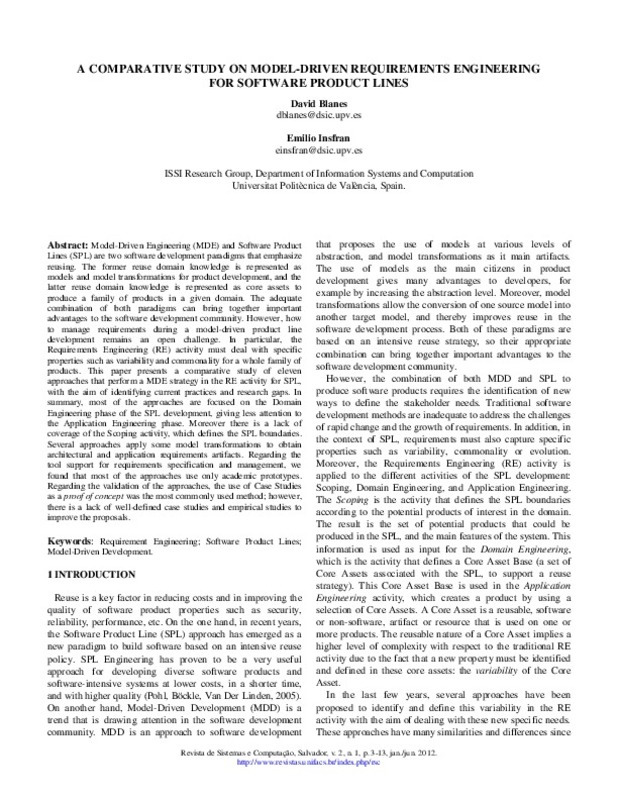JavaScript is disabled for your browser. Some features of this site may not work without it.
Buscar en RiuNet
Listar
Mi cuenta
Estadísticas
Ayuda RiuNet
Admin. UPV
A Comparative Study on Model-Driven Requirements Engineering for Software Product Lines
Mostrar el registro sencillo del ítem
Ficheros en el ítem
| dc.contributor.author | Blanes Domínguez, David
|
es_ES |
| dc.contributor.author | Insfrán Pelozo, César Emilio
|
es_ES |
| dc.date.accessioned | 2014-11-04T11:24:25Z | |
| dc.date.available | 2014-11-04T11:24:25Z | |
| dc.date.issued | 2012-06 | |
| dc.identifier.issn | 2237-2903 | |
| dc.identifier.uri | http://hdl.handle.net/10251/43841 | |
| dc.description.abstract | [EN] Model-Driven Engineering (MDE) and Software Product Lines (SPL) are two software development paradigms that emphasize reusing. The former reuse domain knowledge is represented as models and model transformations for product development, and the latter reuse domain knowledge is represented as core assets to produce a family of products in a given domain. The adequate combination of both paradigms can bring together important advantages to the software development community. However, how to manage requirements during a model-driven product line development remains an open challenge. In particular, the Requirements Engineering (RE) activity must deal with specific properties such as variability and commonality for a whole family of products. This paper presents a comparative study of eleven approaches that perform a MDE strategy in the RE activity for SPL, with the aim of identify ing current practices and research gaps. In summary, most of the approaches are focused on the Domain Engineering phase of the SPL development, giving less attention to the Application Engineering phase. Moreover there is a lack of coverage of the Scoping activity, which defines the SPL boundaries. Several approaches apply some model transformations to obtain architectural and application requirements artifacts. Regarding the tool support for requirements specification and management, we found that most of the approaches use only academic prototypes. Regarding the validation of the approaches, the use of Case Studies as a proof of concept was the most commonly used method; however, there is a lack of well-defined case studies and empirical studies to improve the proposals. | es_ES |
| dc.description.sponsorship | This research is part of the MULTIPLE project (with ref. TIN2009-13838). | |
| dc.language | Inglés | es_ES |
| dc.publisher | UNIFACS | es_ES |
| dc.relation.ispartof | Revista de Sistemas e Computação | es_ES |
| dc.rights | Reserva de todos los derechos | es_ES |
| dc.subject | Requirement Engineering | es_ES |
| dc.subject | Software Product Lines | es_ES |
| dc.subject | Model-Driven Development | es_ES |
| dc.subject.classification | LENGUAJES Y SISTEMAS INFORMATICOS | es_ES |
| dc.title | A Comparative Study on Model-Driven Requirements Engineering for Software Product Lines | es_ES |
| dc.type | Artículo | es_ES |
| dc.relation.projectID | info:eu-repo/grantAgreement/MICINN//TIN2009-13838/ES/Multimodeling Approach For Quality-Aware Software Product Lines/ | es_ES |
| dc.rights.accessRights | Abierto | es_ES |
| dc.contributor.affiliation | Universitat Politècnica de València. Departamento de Sistemas Informáticos y Computación - Departament de Sistemes Informàtics i Computació | es_ES |
| dc.description.bibliographicCitation | Blanes Domínguez, D.; Insfrán Pelozo, CE. (2012). A Comparative Study on Model-Driven Requirements Engineering for Software Product Lines. Revista de Sistemas e Computação. 2(1):3-13. http://hdl.handle.net/10251/43841 | es_ES |
| dc.description.accrualMethod | S | es_ES |
| dc.relation.publisherversion | http://www.revistas.unifacs.br/index.php/rsc/article/view/2174 | es_ES |
| dc.description.upvformatpinicio | 3 | es_ES |
| dc.description.upvformatpfin | 13 | es_ES |
| dc.type.version | info:eu-repo/semantics/publishedVersion | es_ES |
| dc.description.volume | 2 | es_ES |
| dc.description.issue | 1 | es_ES |
| dc.relation.senia | 238422 | |
| dc.contributor.funder | Ministerio de Ciencia e Innovación |






